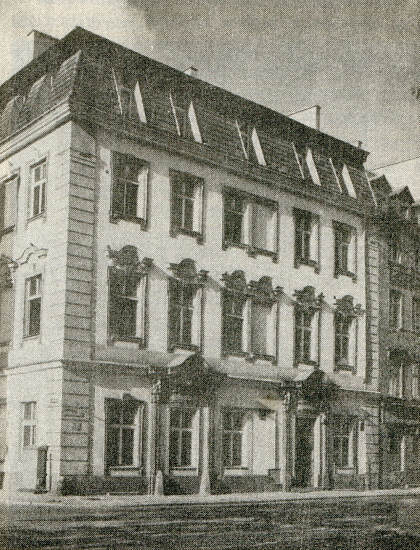Opracowała: Natalia Paprocka
Lata 40 i 50
24th August 1945
– The University and the Polytechnic of Wrocław come into being by the Decree of the Provisional Government of National Unity. Among the created faculties there is also romance studies.
 |
bbb |
The current building of the Institute of Romance Philology at 4 Nankiera Street in the years 1945-1948
(source: http://fotopolska.eu) |
1945/1946
– First academic year of Romance Philology (12 students).
– The Chair in French (later Romance) Philology was created thanks to scholars from Lvov.
– First employees :
Jerzy Kuryłowicz – the first Chair director
Zygmunt Czerny – Chair director from 1947
Jan Kott
Anna Czyżowska-Nikliborcowa
Rachmiel Brandwajn
Ewa Rzadkowska
Krystyna Felińska
1951/1952
– Suspension of admissions to Romance Philology.
1957
– Reactivation of the Chair of Romance Philology under the direction of Leon Zawadowski.
Lata 60 i 70
1960/1961
– Admission of the first 16 students after the reactivation.
– Employees:
Jerzy Adamski (cooperation)
Krystyna Falicka
Jerzy Falicki
Krystyna Felińska
Stanisław Gniadek (cooperation)
Józef Heistein
Michał Michalak
Anna Nikliborcowa
Mieczysława Sekrecka
1968
– Jan Trzynadlowski becomes the Chair director.
1969
– Józef Heistein takes charge of the Chair. He fills the director’s post until 1991, with a few intervals, during which he was replaced by Bogdan Siciński and Edmund Sikora.
– Reform of the university’s organisation structure: the chairs become institutes. Romance Philology however remains a Chair, with three research and teaching teams in: (a) romance literatures, (b) French language teaching and (c) in French literature.

The building in Nankiera Street in the 1960s (source: http://fotopolska.eu)
1970-1973
- Renovation works in the building at 4 Nankiera Street, where the Institute of Romance Philology was moved in 1973.
1973
– The conversion of the Chair into the Institute of Romance Philology.
1974
– Appointment of three units within the Institute: (a) Department of the History of French Literature, (b) Department of Linguistics and French Language Teaching and (c) Department of Italian Philology and Other Romance Languages.
1976
– Creation of two departments instead of three: (a) Department of Romance Linguistics and (b) Department of Romance Literatures.
1978
– Creation of the third department: Department of Didactics of Romance Languages.

The Institute building in the years 1975-1980 (source: http://fotopolska.eu)
Lata 80 i 90
1984 and 1985
– Suspension of students’ admissions.
1986/1987
– Renewal of the admissions and introduction of two specializations – Italian studies and Hispanic studies.
1987
– Creation of the departments of Hispanic and Italian Studies.
1990/1991
– Creation of the Spanish profile of the Romance Philology as a separate degree.
– Creation of two new departments: Department of Hispanic Studies and Department of Italian Studies (in all there were 5 departments).
1991
– Beginning of the introduction of two level studies system in the French profile.
1997
– Approval of the two level system of studies in the Spanish profile (taking effect in the academic year 1998/1999).
– Introduction of two level extra-mural studies in Italian Studies.
Początek XXI wieku
2008-2010
- The renovation of the building of the Institute of Romance Philology:
The aim of the reconstruction, carried out with determination from 2005 by prof. Krystyna Gabryjelska, was both to restore its historical value and to create functional conditions compatible with modern standards. (…)
The project was developed by architect Strefan Zalewski, with constant cooperation with the restoration department and the direction of the Institute,. A lift was installed in the area of courtyard, now covered with a glass roof. By connecting its shaft to the storey walls with clever landings, the area for a passageway was found, which made it possible to recreate the initial dimensions and arrangement of spaces.
The reconstruction of the attic gave the impression of a mansard roof with the loss of almost no usable space. As a result of Piotr Wanat’s research, the elevation was painted in contrastive, early-baroque colors. At the end of the reconstruction, architect Józef Cempa designed the woodwork, giving the interiors the final touch: beautiful doors, cupboards and information boards, all according to the historical styles, as well as little cozy nooks where one can sit with one’s laptop on a cast-iron bench. (Krzywka 2011: 35)
The renovation in the Press:
Romaniści po remoncie wracają na plac Nankiera
Uniwersytet Wrocławski przechodzi remonty
Dolnośląska Budowa Roku - 2. miejsce w kategorii Rewaloryzajca i rewitalizacja obiektów zabytkowych

Renovation of the building (source: http://dolny-slask.org.pl)
 |
cccc | During the renovation in the building on Nankiera Street, the Institute of Romance Philology was temporarily moved to 21, Komuny Paryskiej Street. |
Bibliografia
Józef Heistein, (1987), "Les directions de recherches à l’Institut de Philologie Romane", Romanica Wratislaviensia, XXVII, ss. 5-9.
Łukasz Krzywka, "Budynek Romanistów" [in:] Przegląd Uniwersytecki, R. 17, Nr 4 (177), kwiecień 2011, s. 35.
Ewa Kulak, (2002), "Między komparatystyką i przekładoznawstwem : romanistyka wrocławska w latach powojennych", [in :] E. Skibińska, M. Cieński (dir.), Język – Stereotyp – Przekład, Wrocław : Dolnośląskie Wydawnictwo Edukacyjne, ss. 15-24.
J. M-J, B.P, "Ach, ci romaniści…", [in:] Przeglad Uniwersytecki, nr 6–8/2012, ss. 33-35.
Jolanta Małecka-Juchymiuk, Bogusław Panek, "Ach, ci romaniści..." (wersja rozszerzona).
Elżbieta Skibińska, (2011), "Les études romanes en Pologne : la traduction dans la recherche et dans l’enseignement", [in :] T. Giermak-Zielińska, Z. Naliwajek, J. Żurowska (dir.), Les études romanes/françaises hier et aujourd’hui : 90 ans des études romanes à l’Université de Varsovie, Warszawa : Wydawnictwo Uniwersytetu Warszawskiego, ss. 79-86.
Fotografie Instytutu Filologii Romańskiej dostępne są na stronie:
http://fotopolska.eu/Wroclaw/b9014,Instytut_Filologii_Romanskiej_UWr.html
Witold Ucherek, "L'état de l'enseignement du français à l'Université de Wrocław", Revue du Centre Européen d'étues slaves, nr 3: "La réception de la langue et de la culture françaises dans les pays de l'Europe de l'Est", études réunies et présentées par Justyna Bajda, Witold Ucherek et Sanja Boskovic.

